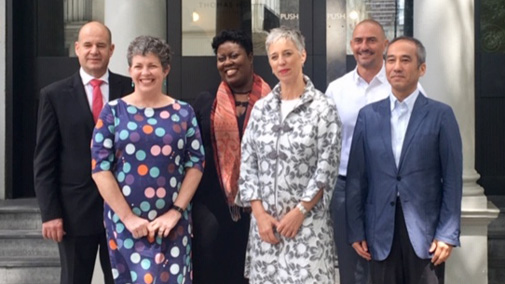Australia, Ecuador, Ireland, Japan, Malta, Rwanda, Trinidad and Tobago – what do they have in common? At first glance, not so much but the members of the new WCPT Executive Board hail from these countries.
Some have been or are currently the president or vice president of their professional organisations. One was instrumental in the foundation of the professional organisation. One has been the chair of a WCPT region and another the chair of a regulatory authority. They are clinicians, managers, researchers, teachers, humanitarian workers. They are mothers, fathers, sisters, brothers, aunts and uncles. Between them, they speak eight languages.

Working in a team can be rewarding and challenging. Working in a group that is more than the sum of its parts is when the magic happens. We all know those teams and groups: the ones where it seems effortless. We have either observed them or been part of them, or both.
The Spaghetti Tower is an exercise where a group of four people are given 20 pieces of uncooked spaghetti, one yard of tape, one yard of string and one marshmallow. Peter Skillman used this as a competition to understand more about design teams. The challenge is to build the highest structure that will hold the marshmallow on the top in 18 minutes. The groups observed included business students, engineers and other highly experienced people. But the groups who consistently built the highest structure were the kids from kindergarten. They succeeded not because they were smarter but because they worked smarter.
I read about this experiment in Daniel Coyle’s book The Culture Code: The secrets of highly successful groups. The board of 2015-2019 and the current board are like so many physiotherapists around the world: constantly on the quest for new knowledge to inform their ‘practice’. At our first board meeting in London in early July, we didn’t build a marshmallow tower but we did spend one day focusing intentionally on how we will work as a group. Unfortunately, one of our board members was unable to join us because of the challenges of getting a visa to enter the UK but those of us who were present considered culture, communication, the experiences we bring to the table, the challenges we anticipated and the positive ways we would address them.
We talked about managing conflict of loyalty, conflict of interest and simply conflict. We used appreciative enquiry to learn more about one another and role play to highlight positive and negative behaviours. It was a fascinating, exhausting and exciting but ultimately it will help to make us a better Board. Coyle suggests that there are three skills to create the culture that enables groups to be successful – building safety, sharing vulnerability, establishing purpose. In spending time together as a group we covered all these concepts. We also generated a set of agreed behaviours that will enable us be the best version of ourselves in the service of WCPT and the global physiotherapy community.
The members of the WCPT board serve as trustees of WCPT Charity and are non-executive directors of WCPT Trading. These roles come with significant legal and fiduciary responsibility. The board answers to WCPT’s member organisations and is mandated by them to oversee the work of WCPT for the coming four years.
It is a huge honour to serve with this distinguished group of people. This will be another remarkable journey, I have no doubt. And I know there will be fun along the way too.

